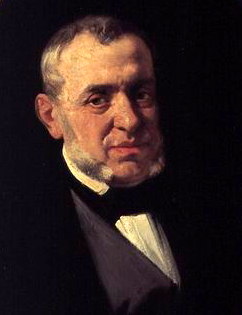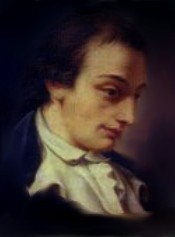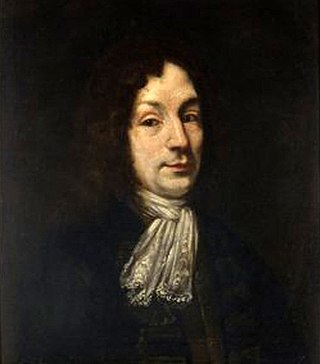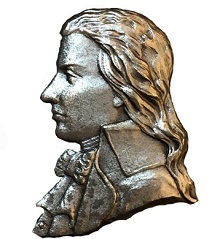Giuseppe Arena (1707 [1] or 1713 [2] -1784) was an Italian composer and organist, best known for his operas.
Giuseppe Arena was born in Malta in 1707 or 1713. From 1725 on he studied at the Poveri di Gesù music conservatory, where his teachers included Gaetano Greco and his successor Francesco Durante. Giovanni Battista Pergolesi started studying at the same conservatory in 1725 as well. [1]
He may have worked for the prince of Bisignano, and is also said to have been the organist at the San Filippo Neri church in Naples. [1]
In 1738, his first opera, Achille in Sciro , premiered in Rome, as did Il vello d'oro in 1740 and Farnace in 1742. Other works premiered in Turin, including La clemenza di Tito in December 1738 and Artaserse in 1741. That same year saw the premiere of Titus in Venice, while Naples was the first place were, in 1746, Il vecchio deluso was performed. Later in his career he mostly composed works for smaller groups. He also wrote a treatise, Principij di musica con intavolature di cembalo e partimenti. [1] [2]

Giuseppe Saverio Raffaele Mercadante was an Italian composer, particularly of operas. While Mercadante may not have retained the international celebrity of Gaetano Donizetti or Gioachino Rossini beyond his own lifetime, he composed as prolifically as either and his development of operatic structures, melodic styles and orchestration contributed significantly to the foundations upon which Giuseppe Verdi built his dramatic technique.

Domenico Cimarosa was an Italian composer of the Neapolitan School and of the Classical period. He wrote more than eighty operas, the best known of which is Il matrimonio segreto (1792); most of his operas are comedies. He also wrote instrumental works and church music.

Giovanni Battista Draghi, usually referred to as Giovanni Battista Pergolesi, was an Italian Baroque composer, violinist, and organist, leading exponent of the Baroque; he is considered one of the greatest Italian musicians of the first half of the 18th century and one of the most important representatives of the Neapolitan school.

Pietro Alessandro Guglielmi was an Italian opera composer of the classical period.

Francesco Feo was an Italian composer, known chiefly for his operas. He was born and died in Naples, where most of his operas were premièred.
Giuseppe Farinelli was an Italian composer active at the end of the 18th century and the beginning of the 19th century who excelled in writing opera buffas. Considered the successor and most successful imitator of Domenico Cimarosa, the greatest of his roughly 60 operas include I riti d'Efeso, La contadina bizzarra and Ginevra degli Almieri. More than 2/3 of his operas were produced between 1800-1810 at the height of his popularity. With the arrival of Gioachino Rossini his operas became less desirable with the public, and by 1817 his operas were no longer performed. His other compositions include 3 piano forte sonatas, 3 oratorios, 11 cantatas, 5 masses, 2 Te Deums, a Stabat mater, a Salve regina, a Tantum ergo, numerous motets, and several other sacred works.
Domenico Fischietti (1725–1810) was an Italian composer.

Nicola Sala was an Italian composer and music theorist. He was born in Tocco Caudio and died in Naples. He was chapel-master and professor at Naples, having devoted himself to the collection of the finest models of printed music.

Giuseppe Maria Orlandini was an Italian baroque composer particularly known for his more than 40 operas and intermezzos. Highly regarded by music historians of his day like Francesco Saverio Quadrio, Jean-Benjamin de La Borde and Charles Burney, Orlandini, along with Vivaldi, is considered one of the major creators of the new style of opera that dominated the second decade of the 18th century.

Giuseppe Lillo was an Italian composer. He is best known for his operas which followed in the same vein of Gioachino Rossini. He also produced works for solo piano, a small amount of sacred music, and some chamber music.

Guglielmo Zuelli was an Italian composer, conductor, and music educator. As a composer he achieved fame for his first opera Fata del Nord which premiered in Milan in 1884. Both his first and second opera, Mokanna o Il profeta del Korasan, were published by Casa Ricordi. However, his second opera has never been performed. His other compositions consist of several sacred choral works and a number of symphonic pieces written in a style similar to his contemporaries Giacomo Puccini, Alberto Franchetti, and Pietro Mascagni.
Giuseppe de Majo was an Italian composer and organist. He was the father of the composer Gian Francesco de Majo. His compositional output consists of 10 operas, an oratorio, a concerto for 2 violins, and a considerable amount of sacred music.

Carlo Scalzi was an Italian castrato who had an active performance career in major opera houses in Italy from 1718-1738. He was also heard in London in 1733–1734 where he notably created the role of Alceste in the world premiere of George Frideric Handel's Arianna in Creta. The librettist Pietro Metastasio described Scalzi as a "very unique singer" and likened his voice to that of the famous castrato Farinelli.
Silvio Stampiglia was an Italian poet, librettist, and founder member of the Accademia dell'Arcadia under the pen name of Palemone Licurio. Numerous Italian composers set his libretti to music, particularly Carlo Agostino Badia and Giovanni Bononcini.

Luca Antonio Predieri was an Italian composer and violinist. A member of a prominent family of musicians, Predieri was born in Bologna and was active there from 1704. In 1737 he moved to Vienna, eventually becoming Kapellmeister to the imperial Habsburg court in 1741, a post he held for ten years. In 1765 he returned to his native city where he died two years later at the age of 78. A prolific opera composer, he was also known for his sacred music and oratorios. Although his operas were largely forgotten by the end of his own lifetime and most of their scores lost, individual arias as well some of his sacred music are still performed and recorded.

Sebastiano Biancardi, known by the pseudonym Domenico Lalli, was an Italian poet and librettist. Amongst the many libretti he produced, largely for the opera houses of Venice, were those for Vivaldi's Ottone in villa and Alessandro Scarlatti's Tigrane. A member of the Accademia degli Arcadi, he also wrote under his arcadian name "Ortanio". Lalli was born and raised in Naples as the adopted son of Fulvio Caracciolo but fled the city after being implicated in a bank fraud. After two years wandering about Italy in the company of Emanuele d'Astorga, he settled in Venice in 1710 and worked as the "house poet" of the Grimani family's theatres for the rest of his career. In addition to his stage works, Lalli published several volumes of poetry and a collection of biographies of the kings of Naples. He died in Venice at the age of 62.
Giuseppe Balducci was an Italian composer, primarily of operas. Born in Iesi, he spent most of his career in Naples and was one of the originators of the "salon opera" genre, the forerunner of chamber opera.

Nicola De Giosa was an Italian composer and conductor active in Naples. He composed numerous operas, the most successful of which, Don Checco and Napoli di carnevale, were in the Neapolitan opera buffa genre. His other works included sacred music and art songs. His songs were particularly popular, bringing him fame as a salon composer both in Italy and abroad. De Giosa died in Bari, the city of his birth, at the age of 66.
Giuseppe Puzone was an Italian opera composer and conductor active in Naples, the city of his birth. He was for many years the principal conductor of the Teatro San Carlo where his opera Elfrida di Salerno had premiered in 1849. He composed three other operas, all of which premiered in Naples, as well as sacred and symphonic music.

Luigi Capotorti was an Italian composer of both sacred and secular music. He was the maestro di cappella of several Neapolitan churches; the composer of ten operas, five of which premiered at the Teatro San Carlo in Naples; and a teacher of composition and singing whose students included Stefano Pavesi and Saverio Mercadante. Born in Molfetta, he studied violin and composition at the Conservatorio di Sant'Onofrio in Naples and spent his entire career in that city. In his later years, Capotorti retired to San Severo, where he died at the age of 75.












